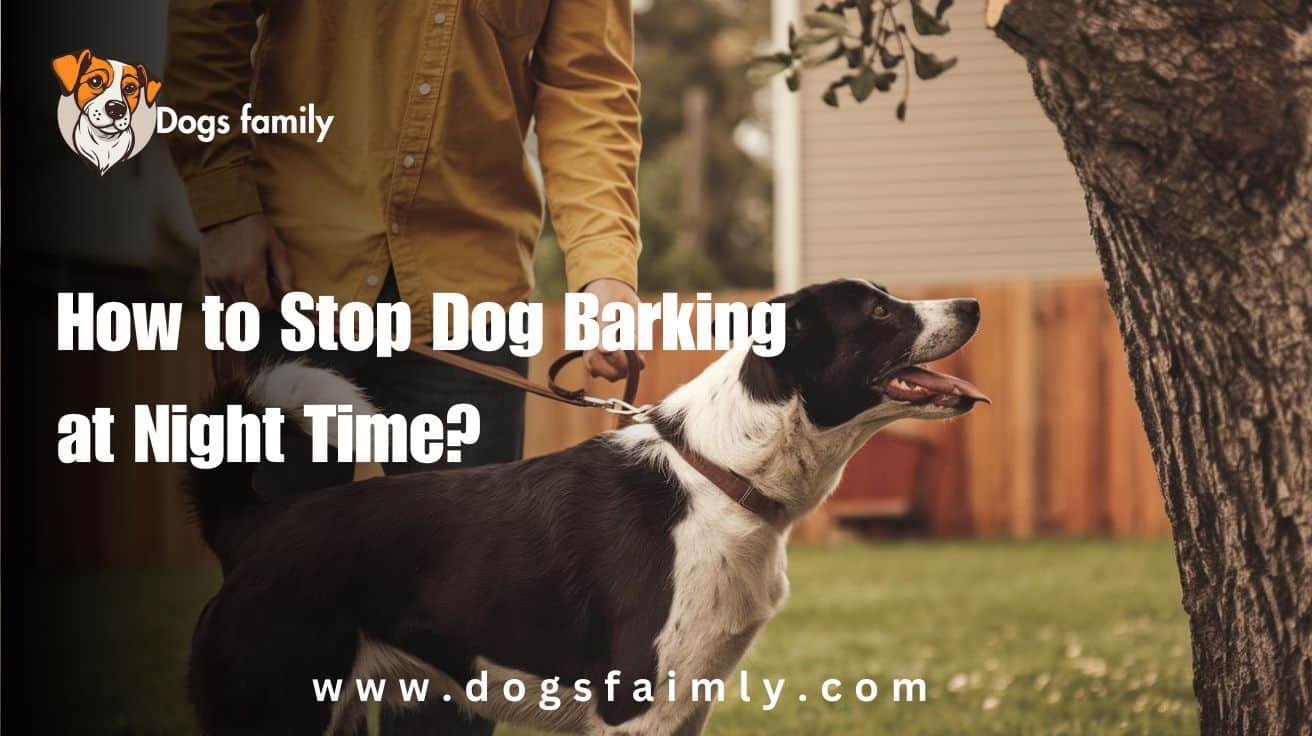If you’re struggling with your dog barking at night time, you’re not alone. Many pet owners face this issue, and it can lead to sleepless nights. In this article, we’ll explore how to stop dog barking at night time by understanding why dogs bark at night and offering practical solutions to restore peace in your home, helping you learn how to stop dog barking at night time effectively.
Why Do Dogs Bark at Night?
Before diving into how to stop dog barking at night time, it’s important to understand why dogs bark, including reasons like anxiety and attention-seeking.
- Attention-seeking: Your dog might be barking because they want attention, food, or playtime.
- Fear or anxiety: Dogs can bark at night due to fears like separation anxiety or unfamiliar sounds.
- Territorial behavior: Your dog may see the night as a time to guard their home and alert you to any potential threats.
- Discomfort or illness: If your dog isn’t feeling well or is uncomfortable, barking may be their way of expressing distress.
Identifying the root cause of your dog’s barking is the first step in solving the issue. Now, let’s move on to some practical steps that will help you figure out how to stop dog barking at night time.
Step-by-Step Guide: How to Stop Dog Barking at Night Time
1. Establish a Consistent Routine
How to Stop Dog Barking at Night Time ? Dogs are creatures of habit, and they thrive on routine. Establishing a consistent routine for feeding, exercise, and bathroom breaks during the day can help your dog feel secure, and with pet insurance for older dogs, you can ensure their health is covered, reducing discomfort that may lead to nighttime barking.
- Walk your dog: A nice walk in the evening can help tire them out, making them less likely to bark out of energy or boredom.
- Set regular feeding times: A well-fed dog is less likely to feel anxious or hungry at night, both of which can contribute to barking.
- Bathroom breaks: Ensure that your dog goes to the bathroom before bedtime. A full bladder can keep them awake and lead to unnecessary barking.
By creating a structured environment, you can help your dog feel more at ease and less likely to bark at night.
2. Create a Comfortable Sleeping Environment
How to Stop Dog Barking at Night Time? Your dog’s sleeping environment plays a crucial role in preventing nighttime barking. If you have an illegal breed of dog in the UK, make sure their space is comfortable and secure to reduce anxiety-induced barking.
- Choose the right bed: A bed that supports your dog’s size and sleeping habits will help them feel relaxed and secure.
- Control the temperature: Make sure the room is at a comfortable temperature—too hot or too cold can make your dog restless.
- Limit distractions: Close windows or blinds to reduce external noises that may trigger barking. Use a white noise machine if necessary to mask sounds.
When dogs feel comfortable in their own space, they are less likely to bark.
3. Use Positive Reinforcement
One of the best ways to teach your dog how to stop dog barking at night time is through positive reinforcement, especially with the most loyal dog breeds.
- When your dog is quiet, reward them with treats or praise. This will help them associate silence with positive outcomes.
- Avoid giving attention to barking: If your dog barks for attention, wait until they stop before you respond. Giving attention when your dog barks reinforces the behavior.
By reinforcing calm behavior, you can teach your dog to be quiet at night.
4. Exercise and Mental Stimulation
A tired dog is a quiet dog! Ensure your dog gets enough exercise and mental stimulation during the day to help them wind down and How to Stop Dog Barking at Night Time?
- Physical activity: Daily walks, runs, or playtime can help burn off excess energy.
- Mental stimulation: Puzzle toys, training sessions, or interactive games can help engage your dog’s mind.
A well-exercised dog is less likely to feel the need to bark at night out of restlessness or boredom.
5. Address Separation Anxiety
Separation anxiety is common in Cute Small Dog Breeds, causing nighttime barking; try strategies to ease their anxiety when left alone.
- Gradual desensitization: Start by leaving your dog alone for short periods and gradually increase the time they are left alone to help them become more comfortable with being by themselves and learn How to Stop Dog Barking at Night Time.
- Create a safe space: Designate a specific area where your dog feels safe, such as their crate or a quiet room. Make it a positive space by adding their favorite blanket or toy.
- Use calming products: Calming collars, sprays, or even anxiety-reducing music can help soothe your dog at night.
With patience and consistency, you can help your dog overcome separation anxiety and reduce nighttime barking.
6. Training Your Dog to Be Quiet
Training your dog to stop barking on command is another useful tool for how to stop dog barking at night time. The “quiet” command can be a game-changer for dogs that bark excessively.
- Teach the “quiet” command: When your dog barks, say “quiet” calmly. Once they stop barking, reward them with a treat.
- Consistency is key: Use the “quiet” command every time your dog barks to teach them how to stop dog barking at night time, helping them learn to be calm.
Training takes time and consistency, but it can be one of the most effective ways to reduce barking at night.
7. Consult a Veterinarian
If your dog’s nighttime barking persists despite your efforts, it may be time to consult a veterinarian. Excessive barking could be a sign of an underlying health issue, such as how to stop dog barking at night time:
- Pain or discomfort: If your dog is in pain, they may bark as a way to communicate their distress.
- Cognitive dysfunction: Older dogs may develop conditions similar to dementia, causing confusion or disorientation, leading to nighttime barking.
- Hearing loss: Some dogs bark more when they can’t hear their owners or the surrounding environment properly.
A veterinarian can help diagnose any underlying issues and provide a treatment plan to address them.
8. Consider Anti-Barking Devices
If your dog’s barking persists and you’ve tried everything else, there are anti-barking devices available that may help. These devices work by emitting a sound or vibration when your dog barks, discouraging the behavior.
- Citronella collars: These collars spray a burst of citronella when your dog barks, which can be unpleasant but harmless.
- Ultrasonic devices: These devices emit a high-pitched sound that is irritating to dogs but inaudible to humans.
While these devices can be effective in certain situations, they should be used as a last resort and in conjunction with positive reinforcement techniques.
Conclusion
If you’re wondering how to stop dog barking at night time, rest assured that it’s possible with the right approach. By understanding the cause of your dog’s barking and using a combination of routine, training, and positive reinforcement, you can help them become calmer and more comfortable at night. Remember, patience is key. Every dog is different, so you may need to try several strategies before finding the one that works for your pet.
FAQs
How can I stop my dog barking at night without punishment?
Positive reinforcement techniques, such as rewarding quiet behavior, can help stop nighttime barking. Avoid rewarding barking, and instead, offer praise or treats when your dog remains calm.
Can a consistent routine help with nighttime barking?
Yes, establishing a consistent daily routine, including regular feeding times and exercise, can reduce anxiety and restlessness, making your dog less likely to bark at night.
What should I do if my dog barks due to separation anxiety?
Gradual desensitization and creating a safe, comfortable space for your dog can help ease separation anxiety and reduce nighttime barking caused by fear of being alone.
Final Words
Nighttime barking can be frustrating, but with the right techniques, it’s a problem you can solve. Whether your dog is barking out of fear, anxiety, or simply to get attention, there are effective strategies to stop the behavior. Be consistent, stay patient, and your dog will soon learn how to stay calm and quiet during the night.
If you’ve tried everything and nothing works, it might be time to explore other options, such as consulting a veterinarian or considering anti-barking devices. The key to solving this issue is persistence and understanding your dog’s unique needs.

